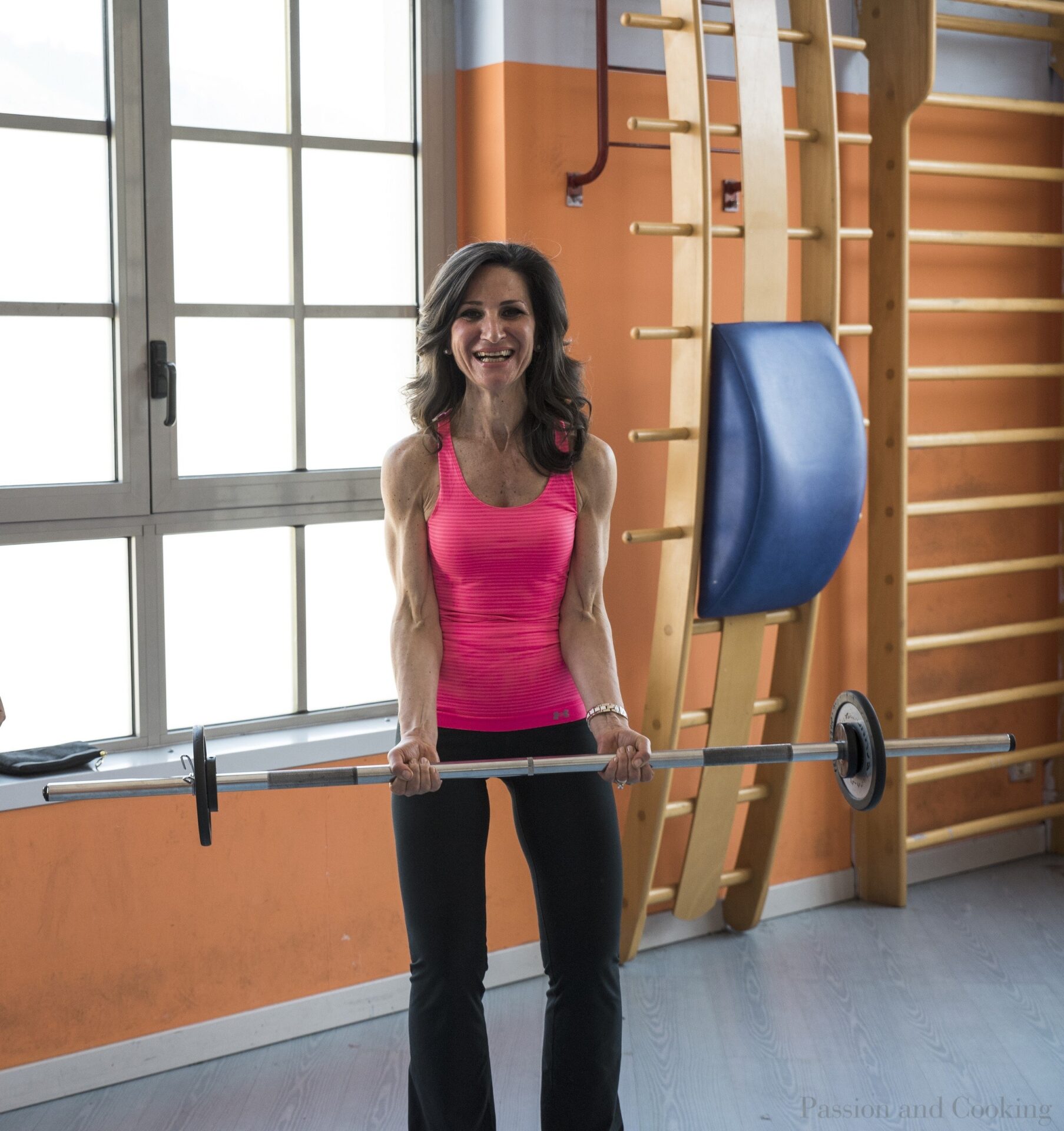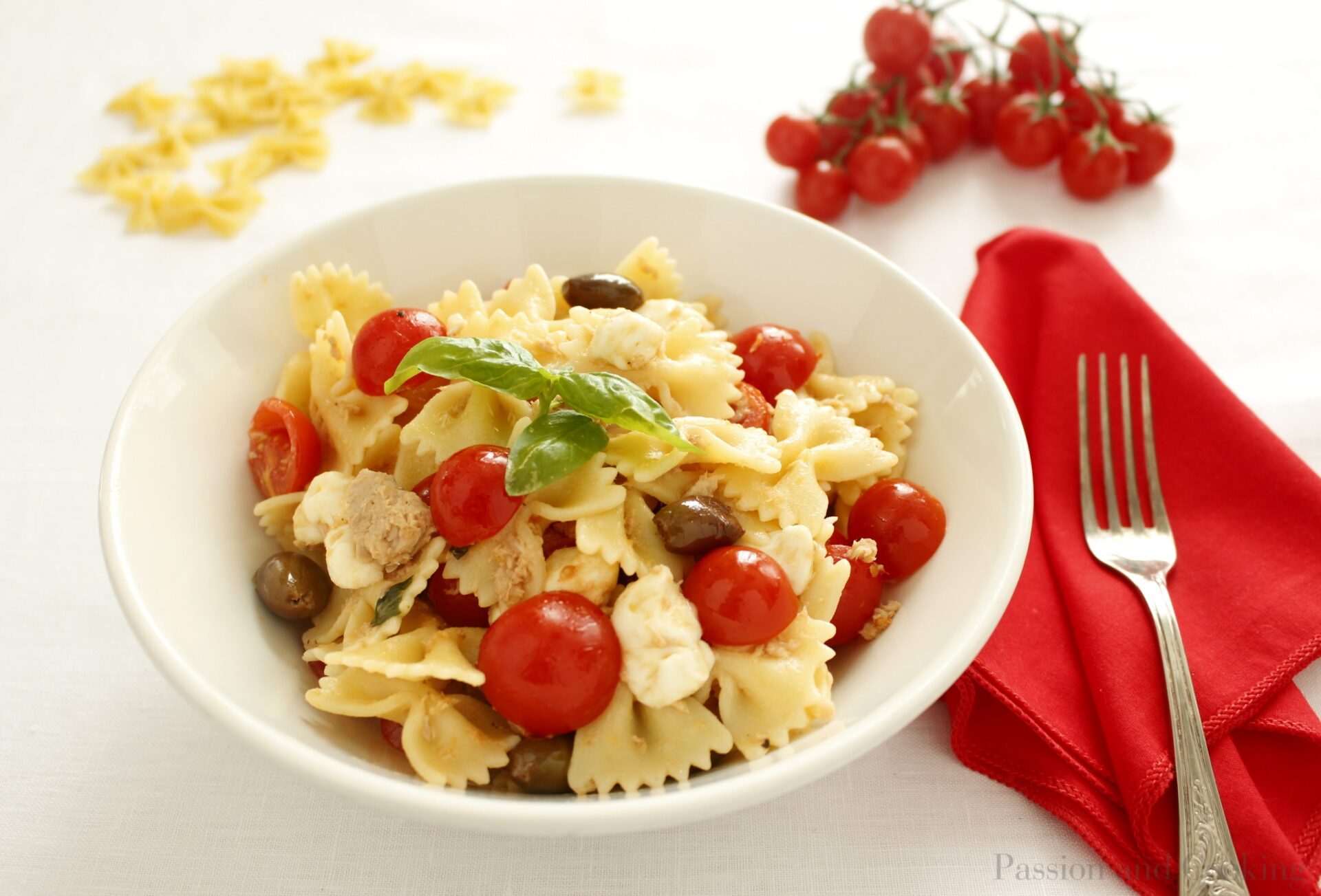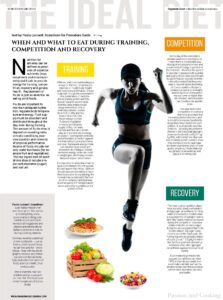You need one for the other!
When and what to eat during training, competition and recovery
Sport medicine professionals suggest that athletes can meet 100% of their dietary needs from a well-balanced diet, like the Mediterranean diet, that addresses performance, hydration, recovery and health. The Mediterranean diet is based on a balanced ratio of omega-6 and omega-3 fatty acids (FAs), good amounts of healthy carbohydrates, lipids, protein, antioxidants and polyphenols and is low in sugar and processed food.
The Mediterranean diet is recognized as the healthier dietary pattern with a lower environmental impact. This tasty pasta salad (see picture below) is a good dish for a summer lunch.
Nutrition for athletes can be defined as provision of essential nutrients (macronurients and micronutrients) and fluids to provide energy for training, competition, recovery and general health. Replacement of fluids is just essential as eating solid foods.
Fluids are important to maintain adequate hydration, regulate body temperature, and also energy. Fluid supply must be abundant and distributed throughout the day, even during training. The amount of fluids should depend on sweating rates, climatic conditions, exercise duration and intensity of physical performance. Source of fluids include not only water but also foods (for example fruit and vegetables). The key ingredients of sport drinks should include simple carbs (sugar) and sodium.
Training
Athletes need to consume adequate energy (in the form of calories) to maintain or modify body weight and maximize performance. Energy is gained through the consumption of a combination of carbohydrates (carbs), protein and fats. Recent research recommends that carbs intake should range from 50% to 70% of total daily calories, protein from 10% to 35% and fats from 20% to 35%. Diet should always contain fruits and vegetables to ensure an adequate supply of fluid, minerals, vitamins and fiber, all of which play an important role in energy production, haemoglobin synthesis and antioxidant protection against the free radicals (produced during exercise). Inadequate energy intake can result in muscle loss and increased risk of fatigue. Instead excessive energy intake can result in weight gain, which may increase fatigue and poor performance.
It is important to adapt the meals to sport commitments in both qualitative and quantitative ways. Athletes should consume full meals at least three hours prior to any training; the interval may be reduced if the food is rich in complex carbohydrates (such as pasta with tomato sauce) accompanied by vegetables and a portion of fruit.
Competition
On the day of the competition, athletes need to concentrate a lot. In fact, there is considerable psychological and physical stress, and requirement of energy to perform at the best. Whatever the sport, it is essential to balance both quantity and quality of nutrients according to the performance required. However, it should be noted that the power supply required varies depending on the competition, the sport (endurance sports or strength), and the duration of the performance (lower or higher than 60 minutes): each discipline has, therefore, its specific rules.
The meal before the competition should be a little more abundant than the evening before the event, and it should be consumed preferably about three hours before the competition. It must provide essential nutrients. Generally the preferred choices to increase body glycogen stores are foods with carbs (1-4 g/kg BW), with low-fat, low-fiber and low-moderate protein content, since they are less prone to cause gastrointestinal problems and promote gastric emptying. Fluids intake for euhydration is essential as well (about 5-10 ml/Kg BW).
Recovery
The main post-competition objectives are undoubtedly re-hydration and glycogen re-synthesis. Drinking water and sodium at modest rates is suggested for re-hydration and to eliminate “waste material” produced during the competition. Excessive intake of alcohol is discouraged during the recovery period due to its diuretic effects. Glycogen restoration is one of the main goals. Refueling requires an adequate intake of carbs (about 1-1,2 g/kg/h) within the first hour post exercise and up to 6 hours after, when glycogen re-synthesis appears to occur most rapidly.
The content of this post belongs to an article I wrote for the Australian Magazine -SEGMENTO SPORT, July 2017, pag. 42. – Paola



Leave a Reply